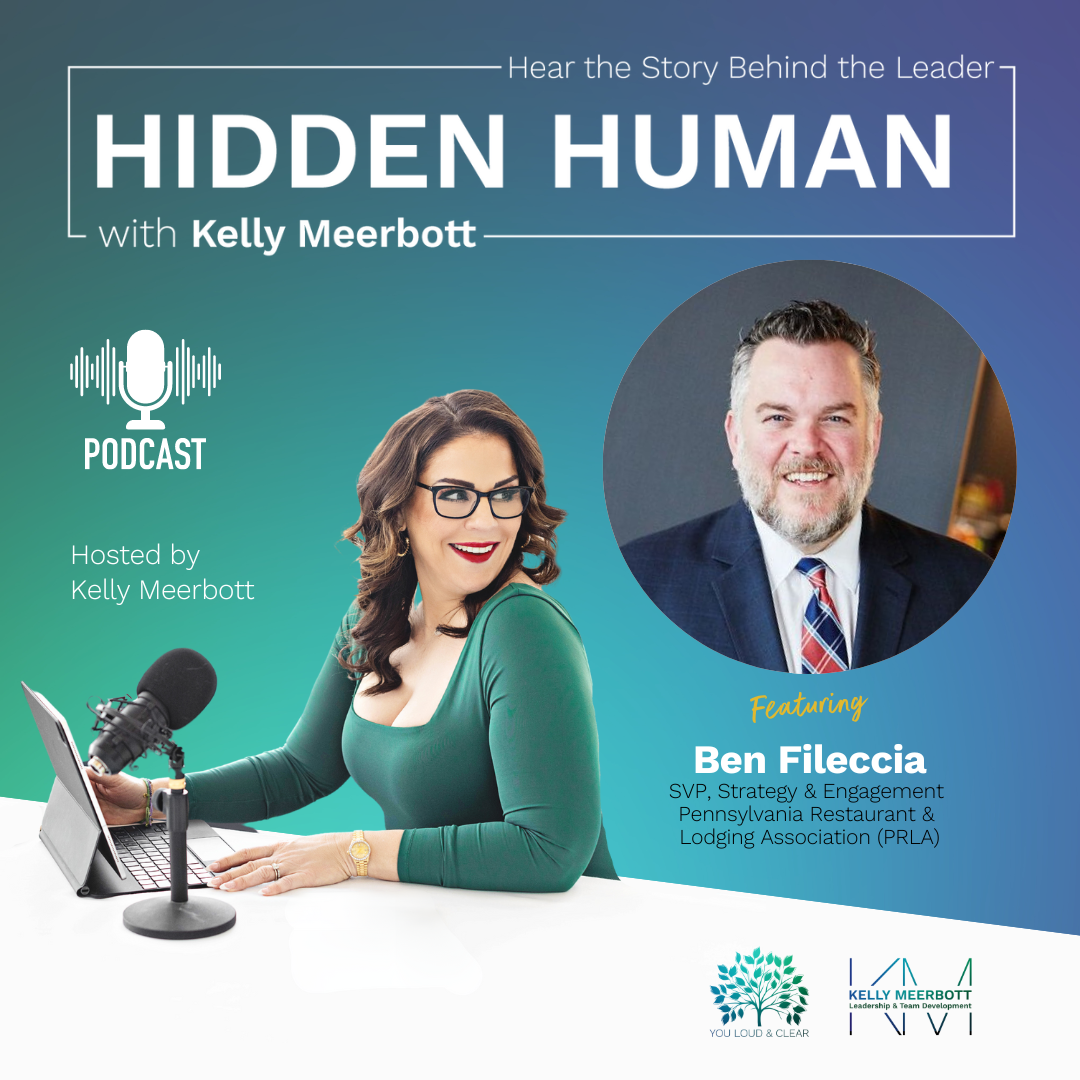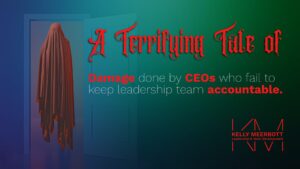TRANSCRIPT
Kelly Meerbott: Welcome to the space where we reveal our personal humanity to reconnect with our shared humanity. Per usual, I am very, very excited about our guest, Ben Fileccia, who is the Senior Vice President of Strategy and Engagement for the Pennsylvania Restaurant and Lodging Association. Ben is also a great friend, great ally, and fantastic leader that we have here in Philadelphia. Ben, thank you for being here with us.
Ben Fileccia: Thanks so much for having me.
Kelly Meerbott: If I were a six-year-old child, and you were going to explain to me in a way I understand what it is you do, how would you explain that to me?
Ben Fileccia: Sure, absolutely. The PRLA supports and represents all the hospitality entities in Pennsylvania, whether it’s restaurants, hotels, events, caterers, or destination marketing organizations like Visit Philly, Visit Delco, Discover Lancaster. Anything under the umbrella of hospitality, we provide resources, guidance, and lobbying efforts. We work to create good legislation that helps our industry both on the employer and employee level. I came up in restaurants, so if somebody asked me what I do now, I guess I help them to succeed.
Kelly Meerbott: And you do that really well. I mean, obviously, we were talking before we started recording. In 2020, you did 2000 interviews to help the entire Pennsylvania hospitality community, correct?
Ben Fileccia: Yeah, there was just so much new information, so much misinformation out there. It was really important to get the correct guidance out to the operators and employees, especially regarding pandemic mitigation. Opening and closing restaurants, social distancing, mask-wearing—all those issues had real impacts on people’s livelihoods. It was crucial to keep everybody up to date so they would be best prepared for what was coming and to avoid breaking any new laws or regulations.
Kelly Meerbott: 2020 seems like a lifetime ago, doesn’t it? It’s crazy. But it seemed like laws were coming fast and furious, especially in the hospitality industry. Government doesn’t usually move that fast, but it felt like every day there was something new. Is that how you experienced it?
Ben Fileccia: Yeah, and we just didn’t know. Four years ago this week, we had been locked in our houses for six weeks. Restaurants thought they would be opening soon because we were told it would be six weeks. It was really important to help these guys out, and you’re right, things were moving very quickly. The silver lining was that the support for the industry also moved quickly, both federally and statewide. We got a lot of financial support into operators’ and employees’ hands quickly, which was crucial.
Kelly Meerbott: I agree with you. Watching it was shocking. Especially since a good percentage of my portfolio as a coach involves huge government entities. I was like, “Y’all moved fast in 2020! What’s going on?” One positive impact on the restaurant industry seems to be the tipping structure. My husband, who’s a former professional chef and now teaches in West Philly schools, and I always kept 20%, now 25% as our standard unless service is really bad. It seems like tipping is swinging that way. Is that fair?
Ben Fileccia: To some extent. The general population realized how hard restaurant employees worked and how essential they were. Menu prices have gone up, which affects tipping. Some people tip more, but others tip less because the bill is higher. We’re also seeing movements around the country to eliminate the tip credit, like in DC and Chicago, which changes the entire hospitality industry. There’s a misconception that servers and bartenders are paid below minimum wage. While they do get a tip wage, if they don’t make minimum wage in tips, the owner has to make it up. In my 20 years of operations, I never had to make up someone’s wage. The average server in Pennsylvania makes around $27 an hour, closer to $40 in the Philadelphia region. Servers want to control their income, and eliminating the tip credit might reduce staff and diminish hospitality.
Kelly Meerbott: One of the things I love about you is your story of coming up through restaurants. You’ve occupied every space there is in the restaurant industry. Is there a pivotal moment in your career that significantly shaped your leadership style?
Ben Fileccia: I went out to dinner last night and ran into a former chef now working as a bartender. He reminded me of how much things have changed. In my early 20s, I worked for Acme Markets, quit my job, and with my older brother, started selling Italian water ice in Florida. It made me realize you can choose your path and find something that makes you happy. It’s about providing for yourself and your family. This mindset has shaped my career—always searching for something I’m passionate about, knowing the money will come later.
Kelly Meerbott: That’s something I teach as an executive coach. You inherently knew that. Fort Myers, where you sold water ice, is close to where I grew up. What you did was innovative, seeing a hole in the market and filling it.
Ben Fileccia: We thought it made sense, but being on the Gulf Coast, people saw it as expensive snow cones. There was a learning curve, but we were groundbreaking at the time. Now, Rita’s has taken over the market down there.
Kelly Meerbott: That’s hilarious and makes sense. Besides your entrepreneurial spirit, who were the leaders that inspired you the most, and what lessons did you take from them?
Ben Fileccia: I spent most of my career operating restaurants and learned a lot of life skills from my experiences. When I worked for Marc Vetri and his partner Jeff Benjamin, Jeff taught me valuable lessons. He made me think outside the box and be hyper-aware of everything going on in the restaurant. It changed my perspective on hospitality, making me more vigilant and aware of people’s needs.
Kelly Meerbott: You’re great at that. Your story reminds me of my time at the Ritz Carlton Palm Beach. Anticipating guests’ needs is crucial. Your ability to elevate hospitality to your current level is a gift to PRLA and the hospitality industry as a whole. How do you cultivate strong team dynamics and foster collaboration?
Ben Fileccia: In restaurants, it was about taking care of the guests, sometimes to the detriment of the staff. Working at Spraga, Chef Kevin Spraga taught me the importance of protecting the team. He once asked me to ask some difficult guests to leave, emphasizing that our team was the most important part. That lesson changed my perspective on hospitality. Now, I focus on praising and fostering the talents of those around me. It’s important to lift each other up.
Kelly Meerbott: 100%. Appreciation is key. Your story about Chef Kevin resonated with me. How do you manage team dynamics now at PRLA?
Ben Fileccia: It’s about fostering collaboration and not being jealous of others’ success. I try to give as much praise as possible and encourage people to kick ass in what they do best. It raises everyone up and creates a positive environment.
Kelly Meerbott: Absolutely. The Pew Research Center found that appreciation is more important to employees than contests, gift cards, or even salary bumps. Moving on, let’s talk about the Philly Chef Conference. How did that come to be, and what are the expected outcomes?
Ben Fileccia: The Chef Conference started 10 years ago in collaboration with Drexel University. It began with local chefs and has grown to include chefs and food journalists from all over the country. It’s a four-day event where chefs discuss important issues facing the hospitality community. It brings in major food journalists, giving Philly’s food scene a worldwide audience. It’s a great opportunity for chefs to showcase their talents and for the community to connect.
Kelly Meerbott: That’s fantastic. What would you say is a common misconception about the hospitality and restaurant industry in Philly and Pennsylvania as a whole?
Ben Fileccia: People don’t realize how collaborative Philly’s restaurant scene is. There’s more collaboration than competition, which is unique. The barrier to entry in Philly is lower than in other cities, allowing more people to open their passion projects. This results in a diverse and vibrant food scene.
Kelly Meerbott: Why do you think Philadelphia journalists didn’t cover the Chef Conference as much as expected?
Ben Fileccia: I’m not sure. There might be a cost involved, but it’s worth it to gain access to such valuable information and connections. National journalists attended, but local media coverage was limited. It would be great to see more local support in the future.
Kelly Meerbott: I’ll definitely come next year. Now, some rapid-fire questions. What is your favorite comfort food?
Ben Fileccia: Lasagna on the second day, either cold or reheated.
Kelly Meerbott: What books are on your nightstand?
Ben Fileccia: I’m reading Erik Larson’s latest book about the climate before the Civil War. I’m a huge historical fiction fan.
Kelly Meerbott: What songs are on your playlist?
Ben Fileccia: I love yacht rock and Paul Simon. Graceland is my desert island album.
Kelly Meerbott: What are you most grateful for in this moment right now?
Ben Fileccia: I love my job and supporting an industry that raised me. I have a beautiful partner and two kids, and we’ve made a lovely home. I feel very blessed.
Kelly Meerbott: Thank you so much for sharing your time and insights with us. If someone wanted to get in touch with you, how would they do that?
Ben Fileccia: The easiest way is email. My email is ben@prla.org.
Kelly Meerbott: Thank you so much for being here, Ben. And thank you to our audience for listening. It’s our intention on Hidden Human to inspire you to go out and have deeper, authentic conversations to deepen those connections. Thank you so much for listening, and make it a great day.





